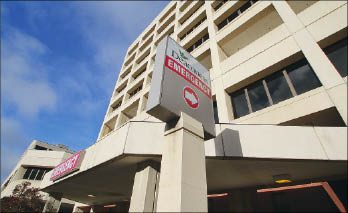
Home » Deaconess set to resume trauma care
Deaconess set to resume trauma care
Hospital applied to state to offer Level III services after dropping Level II

December 16, 2010
Deaconess Medical Center, the Spokane area's second-largest hospital, plans to get back into the trauma-care business beginning Jan. 1.
The action, it says, is part of its still-unfolding, long-term strategy to create an integrated health-care delivery system that encompasses everything from primary and specialty care to urgent and inpatient hospital care, for adults and children.
The 114-year-old institution, which is located at 800 W. Fifth and is licensed for 388 beds, recently received authorization from the Washington state Department of Health to begin providing Level III trauma care, after having applied for that designation last spring.
It had stopped serving as a Level II major trauma hospital in the fall of 2009, relinquishing to larger competitor Providence Sacred Heart Medical Center & Children's Hospital the responsibility for, and the revenue to be derived from, treating the people most critically injured in accidents, crashes, and crimes.
As a Level III facility, it will join affiliate Valley Hospital & Medical Center and Providence Holy Family Hospital here in offering less comprehensive trauma services and in treating less severely injured patients.
"Thrilled. Absolutely thrilled," Adam Richards, director of Deaconess' emergency department, says of how he and the rest of the department feel about the hospital's resumption of trauma care. "This is an exciting thing for us. We're very happy to be back."
Sacred Heart and Deaconess previously had shared the designation of Level II trauma center for a number of years under a joint agreement that called for them to alternate weekly as the region's main trauma center. Deaconess decided, though, not to renew its expiring Level II trauma center status after being notified that Sacred Heart planned to end the joint agreement and to begin offering those services on an independent, uninterrupted basis.
Deaconess noted then, as part of the reasoning for its decision, that only a tiny percentage of its emergency room visits originated as Level II cases. Because of the staffing levels, medical specialties, and equipment required, operating a trauma center is an expensive endeavor.
Julie Holland, a Deaconess spokeswoman, says, "Kind of our plan after that was to see what the need was and then sort of recommit ourselves (in the trauma-care arena) if that was what we felt was needed in the community."
Some of the waiting times at other hospitals' emergency rooms here increased after Deaconess withdrew from providing that care, she says, adding, "We definitely think there is a need in the community for (additional) Level III trauma services."
Deaconess already had much of the medical expertise in place and, what with developments such as its close affiliation now with Rockwood Clinic PS and its accreditation as a chest pain center, "It just seems like a natural step for us," Holland says.
Hospitals offering Level III services can treat critically injured patients with "single-system" injuries, but patients with multisystem trauma, such as the type that would require the attention of both orthopedic and neurosurgical specialists, for example, still would need to go to Sacred Heart, she and Richards say.
The two say they're unsure of the potential financial ramifications the Level III trauma designation will have on Deaconess, but Holland says, "Obviously the emergency room is the 'front door' to the hospital."
She adds, "For us, it's more about the comprehensiveness of the care we can provide in the emergency room" than about its ability to generate added revenue.
Deaconess and Valley Hospital are owned by Community Health Systems Inc., a big Franklin, Tenn.-based company, and Sacred Heart and Holy Family are part of the Spokane-based nonprofit Providence Health Care network.
In all, the state Department of Health designates and administers five levels of acute care trauma services. Deaconess will become one of 26 hospitals in Washington offering Level III care. Sacred Heart is one just five hospitals in the state offering Level II care. Level I hospitals offer the highest level of trauma care, and there's only one of those in the state—Harborview Medical Center, in Seattle.
Separate from the trauma designation, Holland says Deaconess plans to reopen a small general pediatric unit early next year after getting out of that segment of health care a number of years ago, and currently is assembling staff for the unit.
Latest News
Related Articles




![Brad head shot[1] web](https://www.spokanejournal.com/ext/resources/2025/03/10/thumb/Brad-Head-Shot[1]_web.jpg?1741642753)